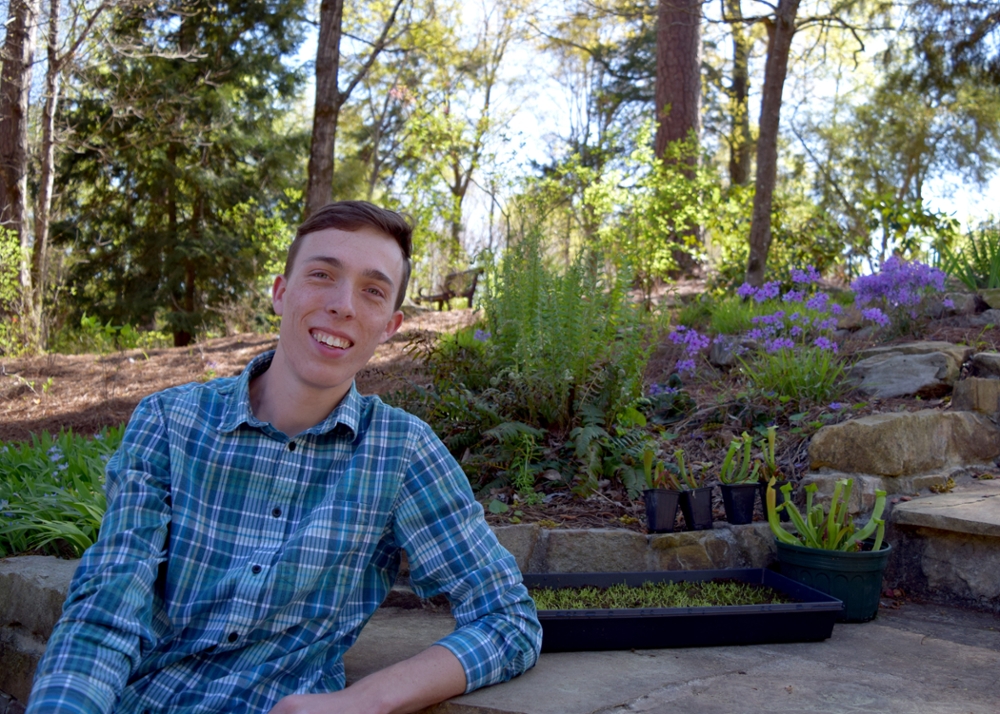COSAM News Articles 2020 January COSAM Student Strives to Conserve, Embrace, and Educate Others on Biodiversity
COSAM Student Strives to Conserve, Embrace, and Educate Others on Biodiversity
College of Sciences and Mathematics (COSAM) student, Noah Yawn, has accomplished more in less than two years at Auburn University than many could ever imagine.
A sophomore in organismal biology, Yawn is the recipient of the Joan K. Hunt and Rachel M. Hunt Summer Scholarship, an undergraduate student assistant at the Davis Arboretum, and a former intern with the Atlanta Botanical Garden. On top of that, and his day-to-day classes and coursework, Yawn is currently analyzing data from his internship to potentially begin writing a manuscript for publication.
“For as long as I can remember, many aspects of the natural world have fascinated me… some people are born with a green thumb – I think I was born with a green brain,” Yawn said.
Prior to attending Auburn, Yawn met Dr. Robert (Bob) Boyd, a professor in the Department of Biological Sciences, at a plant conservation meeting. Since then, Yawn’s interest in conservation and botany grew, and a world of opportunities has been presented before him.
“The Organismal Biology degree was the brainchild of integrating many of the best features of the Department of Biological Sciences, and I felt that it offered me the option to pursue these interests, while also having the flexibility to gain experience in other areas of the department (and COSAM itself). And, as a result, I’ve been able to gain wonderful experiences out in the field, working closely with a few botanists outside of COSAM and with the Davis Arboretum. I can confidently say that if it was not for Patrick Thompson and Dr. Bob Boyd, I would not be in the position I am in as a sophomore at Auburn,” Yawn said.
Before beginning his sophomore year this fall, Yawn spent his summer break conducting censuses and reassessments of the Alabama Canebrake Pitcher Plant, Sarracenia alabamensis. Yawn surveyed the full range of the species by visiting the ten sites the plant is only known to – an area encompassing two central Alabama counties, he said.
“This survey entailed conducting a full population count of the plants, determining their population maturity structure, recording associate bog and invading species, analyzing soil samples at each site, collecting sunlight data, suitable habitat area data, seed production, and seedling recruitment,” Yawn said.
Along with conservationists Jess Stephens, Ron Determann, Patrick Thompson, and Debbie Folkerts, Yawn and his group determined there are about 6,000 of these plants left in the wild. The biggest threat to the species is fire suppression – fire being the “glue” that holds the longleaf pine hills grassland ecosystems together, Yawn said.
Now, Yawn is back into the swing of things as a college student, taking biological science courses, putting in hours at the Davis Arboretum, and pursuing a potential study abroad trip to Peru with Dr. Boyd this spring. Additionally, Yawn is looking forward to continuing work at pitcher plant recovery sites later this fall and winter.
Yawn strives to conserve, embrace, and educate others on biodiversity – whether it is impacting someone else’s view on plants, igniting a passion in someone they did not know they had, or simply helping out the natural world.
“Noah is easily one of the best undergraduate students I’ve seen in my 31 years here at Auburn,” explained COSAM’s Associate Dean of Academic Affairs Dr. Robert Boyd. “Cornell University tried to get Noah to transfer last spring, but I’m extremely glad he decided to stay. I think we can prepare him to go wherever he wants to pursue a graduate degree and I know we will be very proud to have Noah as an Auburn alumnus.”
With a shortage of botanists in the United States, Yawn realizes the importance of informing others on the nation’s biodiversity. Particularly, the southeastern part of the country possesses some of the most threatened communities in the world – per capita, greater than the Amazon rainforest, Yawn said.
“I wholly believe E.O. Wilson chillingly says it best: ‘The time of reckoning is here for the people of Alabama, who must decide whether their state will wear the crown for being the most diverse place on the continent, or the crown for the place with the most extinctions. One thing is certain, Alabama cannot lay claim to both crowns forever,’” Yawn said.
Latest Headlines
-
02/12/2025
-
02/11/2025
-
02/10/2025
-
01/30/2025
-
12/03/2024

